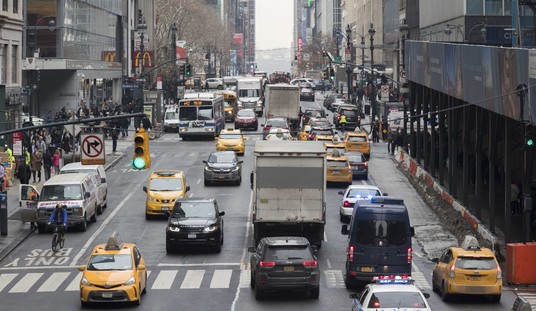Did the Egyptian military make their precarious political situation even worse with an assault on protest camps in Cairo? The death toll has skyrocketed since the assaults ended, with the Health Ministry now admitting that at least 525 people were killed and more than 3500 wounded. They also acknowledge that the eventual totals are likely to be higher, even though the streets have returned to an “eerily calm” state, according to CBS News:
The Egyptian Health Ministry said Thursday that the death toll from clashes between police and supporters of the country’s ousted president had risen to 525.
Ministry spokesman, Khaled el-Khateeb, told The Associated Press that the number of injured in the previous day’s violence had also risen to 3,572. He said the ministry was in the process of updating the latest figures and that an even higher death toll was likely. …
CBS News producer Alex Ortiz, who was in the middle of the violence Wednesday as Egyptian forces laid siege to the protest camp outside the Rabbah al-Adawiya Mosque in Cairo’s Nasr City district, said the Egyptian capital was eerily quiet Thursday morning.
CBS News correspondent Charlie D’Agata reported that driving through Cairo’s streets on Wednesday night, it looked like a war zone and security was clamping down even tighter.
According to Ortiz, the dead protesters didn’t appear to have met their demise in a straight-up fight resulting from a police action that spun out of control. Instead, they appear to have been killed by sniper fire and automatic weapons:
Most of the wounds Ortiz saw Wednesday at a make-shift hospital inside the Rabaah camp were gunshots to the head and chest, consistent with reports of police automatic weapons and sniper fire being directed at the camp. While the violence was not entirely one-sided — protesters pushed over a police car, killing four officers, and there were unconfirmed reports that some protesters were armed — the security forces used overwhelming force against them to clear the camps.
The term “massacre” would arguably apply in this instance. Outrage over the military offensive spilled over into Alexandria, where protesters clashed with police in the streets:
The US issued a condemnation yesterday, but is that sufficient? National Review’s David Gartenstein-Ross argues that it’s time to issue an ultimatum over aid to the Egyptian army, and that American “dithering” contributed to the military’s perception that they could get away with an attack on civilians:
The real problem, then, is that the administration’s public indecisiveness was not accompanied by canny behind-the-scenes efforts, but by dithering in that sphere as well. The U.S. didn’t clearly communicate that there were red lines in dealing with the protesters that could cause a suspension of American aid.
Whatever one thinks of the Brotherhood — and I’m extremely critical of it — the status quo helps nobody. The dead protesters did not deserve to be killed. The moral costs for the U.S. are too high; and from a pragmatic perspective, the country’s image is further damaged in the region because it’s associated with the present atrocities. The mass killings are likely to radicalize the opposition, and predictions that the Brotherhood or significant factions therein could return to anti-government violence look more prescient each day. And al-Qaeda’s narrative is furthered, as Ayman al-Zawahiri’s dark predictions about Egyptian politics seem to be proven correct.
It’s time for the U.S. to end its dithering. While P. J. Crowley argues that the U.S. should now call what happened in Egypt a coup and cut off aid, that suggestion is even less principled than the course the administration took. Crowley’s suggestion would make the definition of a coup dependent upon the actions a military takesafter seizing power; further, it would end U.S. aid without even trying to change the Egyptian military’s posture.
Instead, the U.S. should offer a firm and concrete ultimatum that future aid is conditioned on Egypt’s undertaking a series of changes. For starters, the Egyptian regime should unequivocally apologize for the slaughter of protesters; the officers who ordered Wednesday’s massacre should be held to account and court-martialed; and there should be no further willful mass killings. If Egypt doesn’t comply, 100 percent of the U.S.’s military aid should be suspended.
Until now, the military hadn’t done anything over the last few weeks that they hadn’t done for more than thirty years when the aid flowed into their coffers. The military supported a dictatorship and suppressed dissent, but the aid flowed because we wanted them to keep peace with Israel and cooperate with our intelligence efforts. The problem now is that the political cost of that aid has become much higher after this massacre. Gartenstein-Ross refers to moral cost, which is a factor, but the real issue now is political. The US can’t afford to pay off the Egyptian army and act like nothing happened, and therefore lose whatever credibility we have on human rights and democratization elsewhere, particularly in that region.
At the very least, we have to start acting like the Egyptian military needs us more than we need them, and right now, that’s the actual reality. The army has to start making concessions, or face the oncoming civil war completely on its own.








Join the conversation as a VIP Member